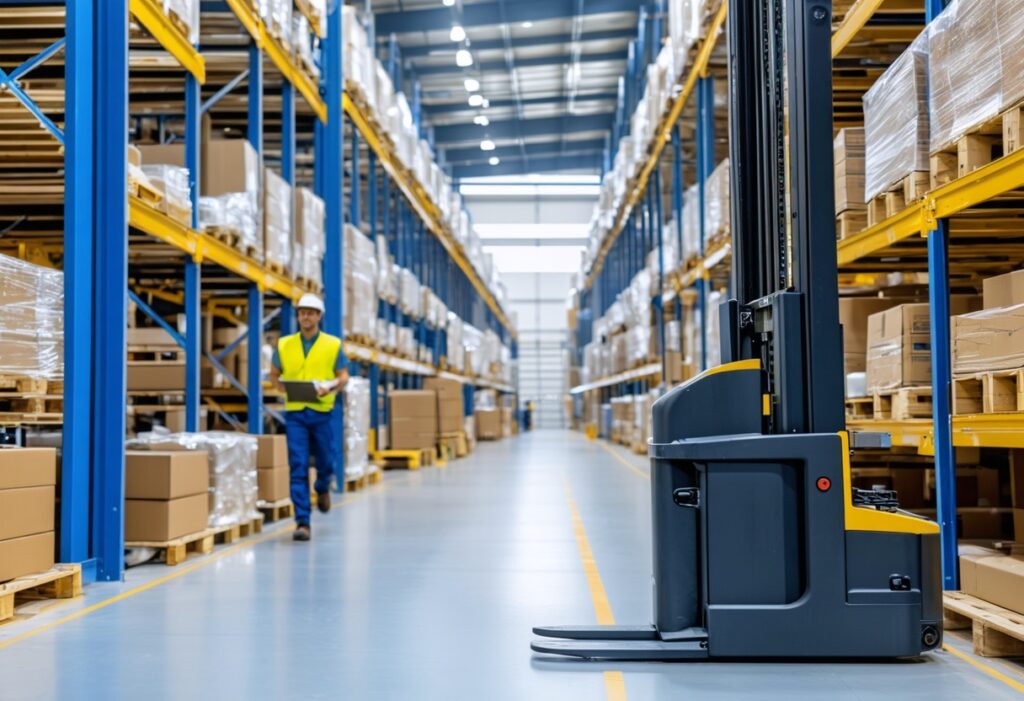Managing warehouse materials handling efficiently is vital for the success of any ecommerce business. Effective handling of inventory and materials can lead to increased productivity, reduced costs, and improved customer satisfaction. This comprehensive guide will cover the key components of warehouse materials handling and provide strategies for optimizing these processes. Additionally, we will discuss the role of technology in enhancing warehouse operations.
Understanding the Basics of Warehouse Materials Handling
Defining Warehouse Materials Handling
Warehouse materials handling refers to the movement, storage, and control of materials within a warehouse or distribution center. It involves processes such as receiving, putaway, picking, packing, and shipping. Efficient materials handling ensures that goods are readily available, organized, and transported safely throughout the warehouse.
One key aspect of warehouse materials handling is the utilization of various equipment and technologies to streamline operations. This can include the use of forklifts, conveyor belts, automated storage and retrieval systems (AS/RS), and warehouse management systems (WMS). These tools help in improving efficiency, reducing manual labor, and increasing overall productivity within the warehouse environment.
Importance of Efficient Materials Handling in Warehouses
Efficient warehouse materials handling plays a significant role in streamlining operations and maintaining customer satisfaction. When materials are handled efficiently, it results in faster order fulfillment, reduced order errors, and improved inventory accuracy. Additionally, effective materials handling helps optimize space utilization, minimize equipment damage, and enhance employee safety.
Moreover, efficient materials handling can also have a considerable impact on cost savings for a warehouse operation. By reducing the time and labor required to handle materials, companies can lower their operational expenses and improve their bottom line. This cost-effectiveness is important for businesses looking to stay competitive in a fast-paced market environment.
Key Components of Warehouse Materials Handling
Inventory Management
Proper inventory management is necessary for efficient materials handling. This includes accurately tracking stock levels, implementing inventory control techniques, and conducting regular cycle counts. By maintaining optimal inventory levels and identifying trends in customer demand, businesses can improve order fulfillment speed and minimize stockouts.
In addition, effective inventory management also involves categorizing items based on their demand patterns and storage requirements. Utilizing techniques like ABC analysis, where items are classified as A (high-value), B (moderate-value), and C (low-value), can help prioritize inventory control efforts. Implementing a just-in-time (JIT) inventory system can reduce carrying costs and minimize excess inventory, leading to cost savings for the business.
Material Handling Equipment
The selection and use of appropriate material handling equipment significantly impact warehouse efficiency. Forklifts, pallet jacks, conveyors, and automated guided vehicles (AGVs) are examples of equipment used to transport and lift materials. Using the right equipment improves productivity, reduces physical strain on employees, and minimizes the risk of product damage.
In addition to the mentioned equipment, technologies such as RFID (Radio-Frequency Identification) and IoT (Internet of Things) sensors are increasingly being integrated into material handling processes. These technologies enable real-time tracking of inventory, enhance visibility into warehouse operations, and facilitate data-driven decision-making. By leveraging advanced material handling equipment and technologies, businesses can enhance operational efficiency and adapt to dynamic market demands.
Warehouse Layout and Design
The layout and design of a warehouse directly affect materials handling efficiency. By optimizing the placement of aisles, workstations, and storage locations, businesses can reduce travel time for employees and streamline order processing. Consideration should be given to factors such as storage capacity, flow of goods, and safety regulations when designing the warehouse layout.
Additionally, incorporating ergonomic principles into the warehouse design can improve employee safety and productivity. Features like adjustable workstations, anti-fatigue flooring, and proper lighting not only enhance worker comfort but also contribute to a more efficient materials handling process. By creating a well-organized and ergonomic warehouse layout, businesses can boost employee morale, reduce workplace injuries, and increase overall operational effectiveness.
Strategies for Optimizing Warehouse Materials Handling
Implementing Automation in Material Handling
Automation technologies, such as conveyor systems, robotic pickers, and automated storage and retrieval systems (AS/RS), can greatly enhance warehouse materials handling. By automating repetitive tasks, businesses can improve efficiency, accuracy, and throughput. Investing in automation also allows employees to focus on value-added activities, such as quality control and customer service.
In addition, integrating automation into material handling processes can lead to a reduction in errors and damages, as machines are less prone to mistakes compared to human workers. This not only improves the overall quality of service but also enhances customer satisfaction by ensuring orders are processed accurately and delivered on time.
Enhancing Warehouse Workflow
An efficient workflow is vital for optimizing warehouse materials handling. By implementing standardized processes and continuously improving them, businesses can reduce bottlenecks and eliminate waste. Streamlining order fulfillment through efficient picking methods, batch processing, and optimized packing and shipping procedures can significantly increase productivity and reduce operational costs.
In addition, utilizing data analytics and warehouse management systems can provide valuable insights into workflow efficiency and help identify areas for improvement. By leveraging technology to monitor key performance indicators and track inventory movement in real-time, businesses can make informed decisions to streamline operations and enhance overall productivity.
Training Staff for Optimal Material Handling
Providing comprehensive training to warehouse staff is important for optimal materials handling. Employees should be trained on proper equipment usage, inventory management techniques, and safety protocols. Ongoing training and performance feedback ensure that staff members stay up to date with industry best practices and are capable of handling materials efficiently and safely.
In addition, fostering a culture of continuous learning and skill development within the workforce can lead to increased employee engagement and job satisfaction. Investing in training programs not only benefits individual employees by enhancing their skills but also contributes to the overall success of the warehouse operation by ensuring a competent and knowledgeable workforce.
The Role of Technology in Warehouse Materials Handling
Warehouse Management Systems (WMS)
A warehouse management system is a software solution that helps businesses automate and optimize warehouse operations. A WMS provides real-time visibility into inventory levels, facilitates order management, and enables efficient materials handling. By integrating with other systems such as enterprise resource planning (ERP) software, WMS solutions enable seamless end-to-end processes and enhance overall warehouse efficiency.
Internet of Things (IoT) in Material Handling
The use of IoT devices, such as RFID tags and sensors, can improve materials handling processes. IoT technology enables real-time tracking of inventory, automated replenishment, and predictive maintenance of material handling equipment. By leveraging IoT data, businesses can make data-driven decisions to optimize warehouse operations, reduce errors, and improve overall productivity.
AI and Robotics in Warehouse Operations
Artificial intelligence (AI) and robotics have transformed warehouse materials handling. AI-powered systems can analyze historical data to predict demand and optimize inventory levels. Robotics, such as autonomous mobile robots (AMRs), can efficiently pick and transport materials within a warehouse. These technologies reduce manual labor, improve accuracy, and enable warehouses to handle larger volumes of orders with greater speed and precision.
The impact of technology on warehouse materials handling goes beyond just WMS, IoT, and AI. There are other innovative solutions that are changing the way warehouses operate.
One such solution is virtual reality (VR) technology. VR can be used to train warehouse employees on complex materials handling tasks in a safe and controlled environment. By simulating real-life scenarios, VR training programs help employees gain hands-on experience without the risk of accidents or damage to inventory. This not only improves employee skills but also enhances safety and reduces operational costs.
Another emerging technology in warehouse materials handling is drones. Drones equipped with cameras and sensors can be used to perform inventory audits, monitor stock levels, and even assist in the picking and packing process. With their ability to navigate through narrow aisles and reach inaccessible areas, drones offer a new level of efficiency and speed in warehouse operations.
Optimizing warehouse materials handling is vital for ecommerce businesses to achieve operational excellence. By understanding the basics of warehouse materials handling, focusing on key components, implementing effective strategies, and leveraging technology, businesses can streamline operations, reduce costs, and enhance customer satisfaction in an increasingly competitive ecommerce landscape. With the continuous advancements in technology, the future of warehouse materials handling holds even more exciting possibilities.
Transform Your Inventory with Finale
Request a Free consultation (valued at $2,500) and let us tackle solving your biggest inventory management challenges with Finale Inventory and experience the difference Finale Inventory can make for your business.






